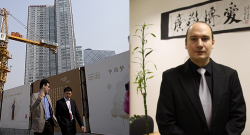赛格德大学孔子学院 - Ahol tudás és szándék találkozik
 孔院新闻存档
孔院新闻存档
 2014
2014
Dr. P. Szabó Sándor: Economy of China lecture on 19 june

Dr. P. Szabó Sándor is the director of the Chinese Public Administration-, Economics-, and Social Research Center at the National University of Public Service, technical director at the School of Far-Eastern Languages.
Time: 19 June 2014 (Thursday) 17:30
Venue: SZTE Confucius Intitute
In 1978, China decided to abandon the Soviet planned economy-model and gradually went through its transition towards socialist market economy, in the framework of which market economy and planned economy co-exist. Due to the gradual economic reforms and opening of its market, China performed an unbelievable economic boom during the ’80s and ’90s and after the millenium as well. In 2011, China already became the world’s largest economy after the United States. Its annual economic growth exceeded 10 per cent (%) for a long time, which China managed to cut down to 7 per cent (%) last year. The Chinese Government also finds this rate of growth too excessive, because it causes serious problems to economic balance, to the environment and to other areas as well. Therefore the Chinese leadership takes great efforts to hold back the rate of economic development. The presentation undertakes to draw the picture of the Chinese economy and to examine the cause and effect of its problems.
P. Szabó Sándor is the head of the Research Institute for Chinese Public Administration, Economy and Society at National University of Public Service, director of the School for Eastern Languages, who works as a consultant on Far Eastern business affairs since 1994 and serves as the editor in chief at Sinology Review since 2009.





